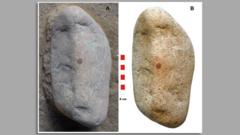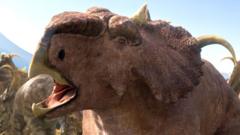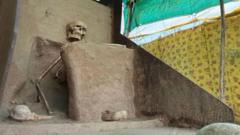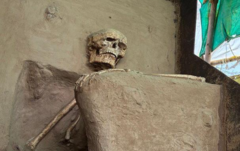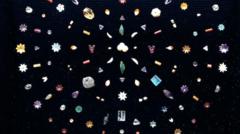Archaeologists have recently discovered a lavish private bathhouse in ancient Pompeii, showcasing the luxury and complexity of Roman society just hours before the eruption of Mount Vesuvius.
**Unearthing Luxury: Stunning Bathhouse Discovered in Pompeii**
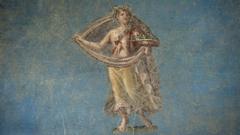
**Unearthing Luxury: Stunning Bathhouse Discovered in Pompeii**
A remarkable archaeological find in Pompeii reveals a grand private bathhouse, offering insights into Roman opulence and daily life.
The archaeological site of Pompeii has always been a treasure trove, but recent excavations have revealed an extraordinary find: a grand private bathhouse, potentially the largest ever unearthed in the ancient city. Hidden beneath layers of ash for nearly two millennia, this “once-in-a-century” discovery provides a vivid glimpse into the opulent lives of its wealthy inhabitants, just before the catastrophic eruption of Mount Vesuvius in 79 AD.
Dr. Gabriel Zuchtriegel, director of the Archaeological Park of Pompeii, describes the site as embodying the “Pompeii effect,” highlighting the remarkably preserved spaces that give the impression of being left only moments ago. The bathhouse features a series of rooms dedicated to different temperatures—hot, warm, and cold—reflecting the sophisticated bathing culture of the time. Elaborately decorated with colourful frescoes, intricate marble floors, and a large plunge pool, the bath was clearly designed for socializing and relaxation.
Along with revealing this lavish bathhouse, the latest excavations also unearthed harrowing evidence of the final moments of some Pompeii residents. The remains of a woman and a young man were found in a small room, having sought refuge from the eruption. With jewelry and coins still in the woman's possession, the discovery underscores the tragic circumstances of their demise as a pyroclastic flow engulfed the city.
The project is among the most extensive excavations of Pompeii in recent years, providing invaluable insights into ancient Roman life and social structures. The newly uncovered area includes various other facilities such as a bakery and laundry, believed to belong to a high-ranking citizen, potentially Aulus Rustius Verus, affirming his elite status through this bathhouse.
In tracing the journey through the bathhouse, visitors would begin in a vibrant changing room, adorned with red walls, before moving to a luxuriously heated hot room. The warm room provided oil treatments followed by skin scrapes, leading finally to the frigidarium—a cold room where bathers could enjoy an expansive plunge pool, capable of accommodating up to 30 people.
The stark contrast between the luxurious living quarters of the wealthy and the grim conditions endured by the slaves who maintained the infrastructure starkly reflects the divisions of Roman society. Areas such as the boiler room highlight the relentless toil faced by the less fortunate, working tirelessly to support the lavish lifestyles of their masters.
As excavations continue and new artifacts emerge, the story of Pompeii evolves, capturing the fascination of historians and the public alike. Dr. Anna Onesti, the excavation’s director, notes that daily discoveries often exceed expectations, keeping the spirit of Pompeii alive and vibrant even today. Eventually, these findings will be opened to the public, allowing a broader audience to engage with the remnants of a once-thriving civilization.
The ongoing documentation of these discoveries is set to air in a BBC series, "Pompeii: The New Dig," showcasing the ongoing efforts to uncover the enigmatic truths of this ancient city.
Dr. Gabriel Zuchtriegel, director of the Archaeological Park of Pompeii, describes the site as embodying the “Pompeii effect,” highlighting the remarkably preserved spaces that give the impression of being left only moments ago. The bathhouse features a series of rooms dedicated to different temperatures—hot, warm, and cold—reflecting the sophisticated bathing culture of the time. Elaborately decorated with colourful frescoes, intricate marble floors, and a large plunge pool, the bath was clearly designed for socializing and relaxation.
Along with revealing this lavish bathhouse, the latest excavations also unearthed harrowing evidence of the final moments of some Pompeii residents. The remains of a woman and a young man were found in a small room, having sought refuge from the eruption. With jewelry and coins still in the woman's possession, the discovery underscores the tragic circumstances of their demise as a pyroclastic flow engulfed the city.
The project is among the most extensive excavations of Pompeii in recent years, providing invaluable insights into ancient Roman life and social structures. The newly uncovered area includes various other facilities such as a bakery and laundry, believed to belong to a high-ranking citizen, potentially Aulus Rustius Verus, affirming his elite status through this bathhouse.
In tracing the journey through the bathhouse, visitors would begin in a vibrant changing room, adorned with red walls, before moving to a luxuriously heated hot room. The warm room provided oil treatments followed by skin scrapes, leading finally to the frigidarium—a cold room where bathers could enjoy an expansive plunge pool, capable of accommodating up to 30 people.
The stark contrast between the luxurious living quarters of the wealthy and the grim conditions endured by the slaves who maintained the infrastructure starkly reflects the divisions of Roman society. Areas such as the boiler room highlight the relentless toil faced by the less fortunate, working tirelessly to support the lavish lifestyles of their masters.
As excavations continue and new artifacts emerge, the story of Pompeii evolves, capturing the fascination of historians and the public alike. Dr. Anna Onesti, the excavation’s director, notes that daily discoveries often exceed expectations, keeping the spirit of Pompeii alive and vibrant even today. Eventually, these findings will be opened to the public, allowing a broader audience to engage with the remnants of a once-thriving civilization.
The ongoing documentation of these discoveries is set to air in a BBC series, "Pompeii: The New Dig," showcasing the ongoing efforts to uncover the enigmatic truths of this ancient city.










